lesson29 come in amy
英语说课Come in,Amy!
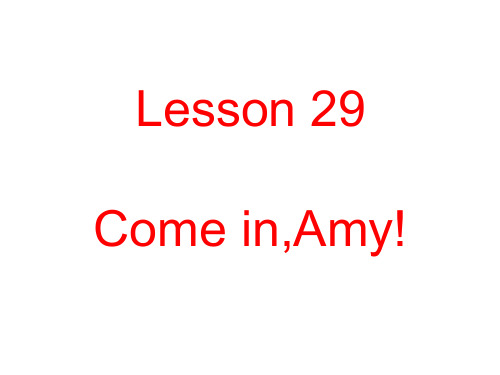
How must Amy clean the floor?
untidy
This bedroom's very untidy.
What must I do?
1
Open the window and air the room
2 put the clothes in the wardrobe
3 make then,Amy!
说教材
我所要讲的新概念第一册第29课的内容。
内容:本次课的重点内容是祈使句的用法, 动介短语的用法和情态助动词的用法。
意义:新一前28课主要讲的是含有Be动词 的主系表结构的句子,L29开始重点突出动 词的用法,动宾结构的用法。通过本课的 学习为以后学习含有动词的各种时态打下 基础.
• You can ask somebody to do
something
• You can only ask somebody to
put sth somewhere
• put up your hand • put up your hands • put on your coat • take off your hat • put off our meeting
说教法 本节课采用任务型教学法,分组教学法,情境 教学法,让学生直观感知祈使句的语气。
说学生 本节课针对五年级学生设计,五年级作为小升 初的一个夯实基础的阶段,所以在语法的学习 中,采用了学生乐于接受的情景教学法让孩子 直接感知这些语法,加强学生的记忆,也符合 现阶段学生的认知规律。
教学目标 知识目标:掌握本课出现的单词和动词短语 及情态助动词must的用法 能力目标:能够熟练运用祈使句和情态动词
• Don't be late! • Don't smoke!
裕兴新概念学习笔记 第一册(29-30)
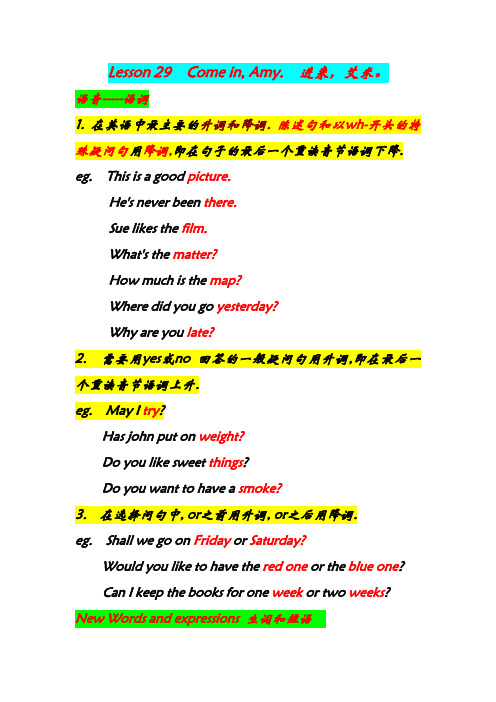
Lesson 29 Come in, Amy. 进来,艾米。
语音-----语调1. 在英语中最主要的升调和降调.陈述句和以wh-开头的特殊疑问句用降调,即在句子的最后一个重读音节语调下降. eg. This is a good picture.He's never been there.Sue likes the film.What's the matter?How much is the map?Where did you go yesterday?Why are you late?2. 需要用yes或no 回答的一般疑问句用升调,即在最后一个重读音节语调上升.eg. May I try?Has john put on weight?Do you like sweet things?Do you want to have a smoke?3. 在选择问句中, or之前用升调, or之后用降调.eg. Shall we go on Friday or Saturday?Would you like to have the red one or the blue one?Can I keep the books for one week or two weeks? New Words and expressions 生词和短语shut v. 关门bedroom n. 卧室untidy adj. 乱,不整齐must modal verb 必须,应该open v. 打开air v. 使…通风,换换空气put v. 放置clothes n. 衣服wardrobe n. 大衣柜dust v. 掸掉灰尘土mop n. 拖把sweep v. 扫shut v. 关门close v. 关shut the door/ close the door 关上门shut the window /close the window 关上窗户shut up! 闭嘴bedroom n. 卧室living room n. 客厅= sitting room kitchen n. 厨房toliet n. 厕所dining room n. 餐厅study n. 书房balcony n. 阳台basement n. 地下室bathroom n. 卫生局,洗澡间untity adj. 乱, 不整齐un 前缀具有否定意思tidy 整齐的untidy 乱,不整齐happy 快乐的, 幸福的unhappy 不快乐的,不高兴的fair 公平的unfair 不公平的fortunately 幸运地fortune 运气/fortunate 幸运的unfortunately 不幸运地must modal verb 必须,应该情态动词can 能够,会should 应该may 可以,可能情态动词没有人称和数的变化,含有情态动词的句子,其否定句是在情态动词后面加not, 疑问句是把情态动词提前.eg. You must shut the door.你必须关门.He must open the window.他必须打开窗户.They must look at the blackboard.他们必须看黑板.We must go to school.他们必须去上学.否定句是在must后面加not.must not = mustn't 决不能,决不可以eg. She must not open the window.她决对不可以开窗户.You must not play with fire.你们千万不要玩笑.They mustn't watch TV.他们不可以看电视.She mustn't go out.她不可以出去.疑问句是把must 前提,肯定回答: Yes, 主+ must.是的,必须否定回答: No, 主+needn't不,不必了-----Must we go to school?我们必须去上学吗?Yes, you must.是的,必须Must they clean the room?你们必须打扫房间吗?No, they needn't.不,不必了.Must we copy these letters?我们必须抄这些信件吗?No, you needn't不,不必了.Must she answer the question?她必须回答这个问题吗?Yes, she must.是的,必须.No, she needn't不,不必了.open adj. 开着的反义词shut或closeopen minded: 开明的,愿意考虑不同意见和想法的eg. My mother is open-minded.我的妈妈思想很开明.open v. 打开open your mouth 张开你的嘴opening time: 开放时间,营业时间air1. v. 使...通风,换换空气air the room 给房间通风1.n. 空气(不可数名词)eg. Let's go out and breathe some fresh air.咱们出去呼吸一些新鲜空气吧!air bed 气垫air mattress 充气床垫air-conditioner 空调put v. 放置put sth +介词短语把...放在... 地方eg. Put your coat on the chair.把你的外套放在椅子上.Put these boxes on the floor.把这些箱子放在地板上.clothes n. 衣服clothes hanger 衣服挂clothes horse 晾衣架(室内) clothes line 晾衣绳clothes peg (Br) 衣架clothes pin (Am) 衣架clothes tree 衣帽架,放衣架wardrobe n. 大衣柜eg. There are some clothes in the wardrobe.有一些衣服在衣柜里.Put these boxes on the floor.把这些箱子放在地板上.dust1. v. 弹掉灰尘dust the dressing table.弹掉梳妆台上的灰尘.2. n. 灰尘(不可数名词)eg. There is some dust on the desk.在书桌上面有些灰尘.sweep v. 扫sweep the floor 扫地TEXT 课文Listen to the text and answer the question:What must Amy do to clean the room?艾米应该做什么来整理房间呢?How must Amy clean the floor? Sweep it.艾米需要如何来清扫地面?扫地MRS. JONES: Come in, Amy.琼斯夫人:进来,艾米。
新概念英语第一册lesson29-30
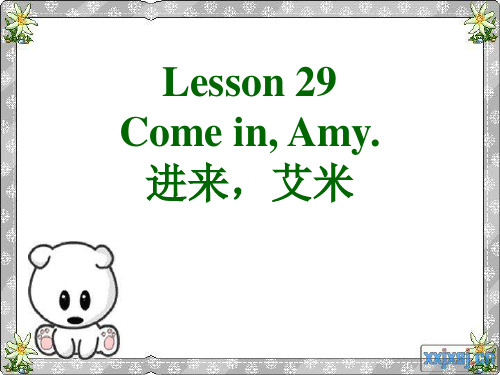
{
dressing table
table
Empty the
{
cup
bottle
newspaper
Read this
{
magazine
Sharpen these
{
Pencils knives
Lesson 30 What must I do?
• • • • • • •
1 empty ['empti] v.倒空,使…变空 2 read [ri:d] v.读 3 sharpen ['ʃɑ:pən] v.削尖,使锋利 4 put on [put'ɒn] 穿上 5 take off [teɪk-ɒf ]脱掉 6 turn on [tə:n-ɒn] 开(电灯) 7 turn off [tə:n-ɒf ]关(电灯)
handbag
Open your Shut
{
book
Put on your Take off
{
clothes
shoes
light
Turn on the Turn off
{
television
floor
Sweep the
{
kitchen
Clean the
{
car
window
Dust the
Come in, Amy . MRS.JONES: Shut the door , please. MRS.JONES: This bedroom’s very untidy. Amy: What must I do, Mrs. Jones ? MRS.JONES: Open the window and air the room. MRS.JONES: Then put these clothes in the wardrob MRS.JONES: Then make the bed . MRS.JONES: Dust the dressing table . MRS.JONES: Then sweep the floor .
新概念一第29课 come in amy

How can we get a clean bedroom?
open the window air the room
put the clothes in the wardorbe make the bed dust the dressing table sweep the floor
新概念的教学目标
祈使句:用于表示请求、命令、建议、 等的句子,常以动词开头, 省略主语。
eg:Open the book; Sit down;
No smoking.
listen to my order!
Touch your head Put up your hands Close you eyes Turn left
新概念英语公开课
1.Are you a lazy(懒惰的) kid? 2.Do you often clean your bedroom?
Lesson 29
Come in,Amy?
Watch the video,then answer the questior
untidy adj. 不整齐 un-前缀,表示否定 happy- unhappy friendly- unfriendly
This bedroom is untidy.
What must I do?
open the window
air the room
air conditioner
clothes n.衣服
1.能够进行日常对话; 2.提高阅读能力及写作水平; 3.词汇量的积累,达到1000词以上; 4. 掌握英语中的基本语法、词法、句法及句型结构. (为小升初做准备)
新概念的教材特点
严密的体系性、严谨的科学性、精湛的实用性、浓郁的 趣味性
新概念第一册Lesson29

• This bedroom is untidy.
• ★untidy adj. 乱,不整齐
• un-前缀,表示否定
• tidy--untidy • happy--unhappy • friend • friendly--unfriendly • kind--unkind
• clothes [kləuðz] n.衣服
祈使句: 1. 用于表达命令、请求、劝告、 警 告、禁止等的句子叫做祈使句。 2. 它的主语是听话的人(you), 一般不需 要说出来。通常以动词原形开头。 如: Stand up! Open the book Get out! Come in. Sit down! Give me a book!
• wardrobe ['wɔ:drəub] n.衣柜 • put [put] V. 放置 • put the clothes in the wardrobe.
• dust [dʌst] v. 掸掉灰尘 • dressing table • dust the dressing table.
Must 必须
祈使句Байду номын сангаас否定
• 当要表达“请不要做什么事”, 就在动词 的面前加Don’t. • 如: Don’t stand up! • Don’t sit down! • Don’t open the book!
情态动词must
(1)情态动词的特征
① 情态动词本身有词义,表示说 话人的语气或情态,但词义不 完全,不能单独作谓语动词, 一般只能和动词原形一起构成 谓语动词 情态动词和助动词shall, will, should, would一样,后面直接 跟动词的原形 情态动词没有人称和数的变化
新概念英语第一册Lesson-29-30课 Come in ,Amy

练一练: 他应该做什么? What must he do? 他应该开窗给房间通风。 He must open the window and air the room.
他们应该干什么? What must they do? 他们应该把衣服放到橱柜里。 They must put the clothes in the wardrobe.
n.灰尘
6. sweep [swi:p] v. 扫 扫地 sweep the floor
1)肯定句
2)否定句:主语+mustn’t+动词原形 你不应该关门。 You mustn’t shut the door.
一般疑问句:Must+主语+动词原形 我应该关门吗? Must I shut the door? 肯定回答: Yes, you must. 否定回答: No, you needn’t.
{ Read this
newspaper magazine
What must I do? Sharpen these
pencils
语法:以动词原形开头的祈使句
1. 祈使句常常是表达说话人对对方的劝告、 叮嘱、请求或命令等。
2.在表达请求或劝告时,在祈使句前或句末 可加上please,以使句子的语气更加缓和 或客气。 Open the window, please. Come in, please.
三、选择题。
• ( C)1.The door is open. You must ____ it.
•
A. open B. opens C. shut D. shuts
新概念成人版一lesson29.30

10.dust[dʌst] v.掸掉灰尘 11.sweep[swi:p] v.扫 12.empty['empti]v.倒空,使…变 空 13.read[ri:d]v.读 14.sharpen['ʃɑ:pən]v.削尖,使锋 利 15.put on[put'ɔn]穿上 16.take off脱掉 17.turn on[tə:n ɔn]开(电灯) 18.turn off[tə:n ɔf]关(电灯)
2.Dust the dressing table 掸掉梳妆台上的灰尘。 dressing table 梳妆台
1
Open the window and air the room.
2
Put the clothes in the wardrobe.
3 make the bed
4
dust the dressing table
open go talk don’t watch Open
1.Don’t sit on the desk. 2.Don’t talk in class. 3.Let’s go to school. 4.Sweep the floor! 5.Let me help you.
将下列汉语翻译成英语
1.不要坐在课桌上。 2.不要在课堂上说话。 3.咱们去上学吧。 4.打扫一下地板! 5.让我来帮你吧。
turn on turn off
Turn on Turn off
Turn on Turn off
Sweep the
Sweep the
Clean the
Clean the
Dust the
Dust the
Empty the
Empty the
新概念英语第一册Lesson29-30ComeinAmy(课件)

Thank you for you watching!
• put /put/ V.放置 • put...into • put...on • put away • put aside • put down
• clothes n.衣服 • my clothes我的衣服 • wash my clothes • cloth • clothing
• wardrobe n.大衣柜
• dust v.掸掉灰尘 • dust the dressing table • Is there any dust on the table
• sweep 打扫 • sweຫໍສະໝຸດ p the floor扫地 • mop
• empty /'empti/站倒空,使 变空 • empty the bottle/box • an empty room
• read v.读 • read books • read-read(过去式) • I like reading. • reading room阅览室
• sharpen v.削尖;使锋利 • sharp锋利的 • sharp teeth锋利的牙齿 • blunt钝的
• put on 穿上 • put on your coat穿上你的衣服
• untidy乱,不整齐 • tidy整理的 • un-前缀表示反义词 • clean and tidy干净又整洁
• must 情态动词;必须, 应该 • You must go to bed now. • Must I submit it now • I must go now. • She must do her homework .
• take off 脱掉 • turn on 开(电灯) • turn off 关(电灯) • turn on the lights打开灯 • Please turn it off请把它关掉
新概念英语第一册Lesson29-30笔记(语法点+配套练习+答案)
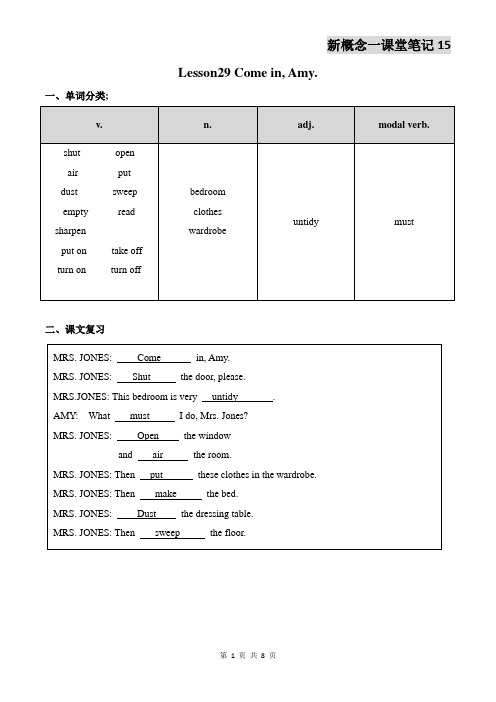
come in
进来
dust the dressing table
给梳妆台除尘
shut the door
关门
sweep the floor
扫地
open the window
开窗
What must I do?
我该做什么?
air the room
给房间通风
put the clothes in the wardrobe
The dustbin is full. Please take the dustbin out andemptyit.
sharpen v.削尖,使...锋利
sharpener n.削笔刀
sharp adj.锋利的
The pencil is blunt.
Get asharpenerandsharpenit.
The floor is dirty, please sweepit.
It’s hot, take offyour coat.
It is dark, turn offthe light.
七、语法练习
1.模仿例句写出相应的祈使句:
Example:The cup isn’t empty.
Empty it!
句型:
肯定句:①Do型:
Look out!/ Stand up! / Shut up!
②Be型:(Be+表语:形容词或名词)
Be careful! பைடு நூலகம் Be yourself! / Be quiet!
③Let型:
Let’s go!我们走!
Let me have a look.让我看一看。
否定句:①Don’t +动词原形
新概念英语第一册29课备课讲稿
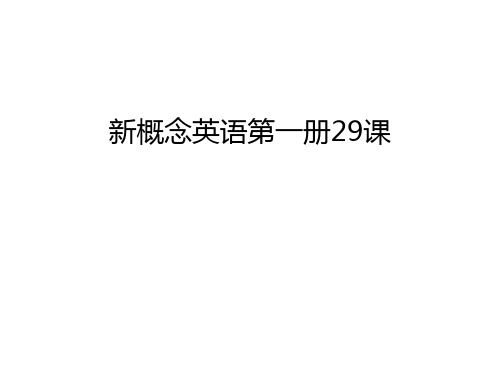
A Then make the bed. B Dust the dressing table. C Open the window and air the room. D Then sweep the floor. E Then put these clothes in the wardrobe.
祈使句,省略主语"you",动词原形开头, 用于表示命令、请求、劝告、警告、禁 止等
Shut the door, please.
MRS.JONES: shut the door , please.
祈使句,省略主语"you",动词原形开头, 用于表示命令、请求、劝告、警告、禁 止等
the door,名词,做shut的宾语。
新概念英语第一册29课
This bedroom is very tidy.
bedroom
Lead-in:
bedroom This bedroom is very untidy.
Lesson 29 Come in,Amy!
New words and expressions:
shut [ʃʌt] V. 关门
形容词做表语
What must I do, Mrs. Joneபைடு நூலகம்?
What must I do,Mrs. Jones?
感受两个句子的语气:你吃饭。 你必须吃饭。
哪个句子让人感觉有命令的语气?
哪个词增加了动词吃的情态语气? must 像这样增加动词情态语气的词就叫情态助动词
must情态动词“必须”,后接动词原形
bedroom['bedrʊm] n.卧室
untidy [ʌn'taɪdɪ] adj.乱,不整齐
新概念英语第一册29课课文及讲解

Lesson 29 Come in, Amy. 进来,艾米。
【单词】shut v. 关门bedroom n. 卧室untidy adj. 乱,不整齐must modal verb 必须,应该open v. 打开air v. 使… 通风,换换空气put v. 放置clothes n. 衣服wardrobe n. 大衣柜dust v. 掸掉灰尘土sweep v. 扫【课文翻译】琼斯夫人:进来,艾米。
琼斯夫人:请把门关上。
琼斯夫人:这卧室太不整洁了。
艾米:我应该做些什么呢,琼斯夫人?琼斯夫人:打开窗子,给房间通通风。
琼斯夫人:然后把这些衣服放进衣橱里去。
琼斯夫人:再把床整理一下。
琼斯夫人:掸掉梳妆台上的灰尘。
琼斯夫人:然后扫扫地。
【知识点讲解】1. 今天这节课的句子大部分都是祈使句。
英文中用祈使语气来表示直接的命令,建议,告诫,邀请等多种意图。
祈使句一般省略主语you,动词采用原形。
2. What must I do? 意思是“我应该做什么?” must是一个情态动词,表示“必须”;这句话还可以说成“What should I do?”,should一样是情态动词,表示“应该”。
3. 讲几个重点词汇:air这个词本身也是名词,意思是空气。
课文里用了它的动词形式,意思是通风换气;我们已经学了好几个和房间名称有关的词,包括bedroom, 卧室;kitchen, 厨房;living room, 客厅。
再补充几个:study room, 书房;dinning room, 餐厅、饭厅;toilet, 厕所。
【作业时间】用今天学到的单词或句型造句一个MRS. JONES: Come in, Amy.MRS. JONES: Shut the door, please.MRS. JONES: This bedroom's very untidy.AMY: What must I do, Mrs. Jones?MRS. JONES: Open the window and air the room. MRS. JONES: Then put these clothes in the wardrobe. MRS. JONES: Then make the bed.MRS. JONES: Dust the dressing table.MRS. JONES: Then sweep the floor.。
新概念英语第一册7课_新概念英语第一册第29-30课-Come,in,Amy
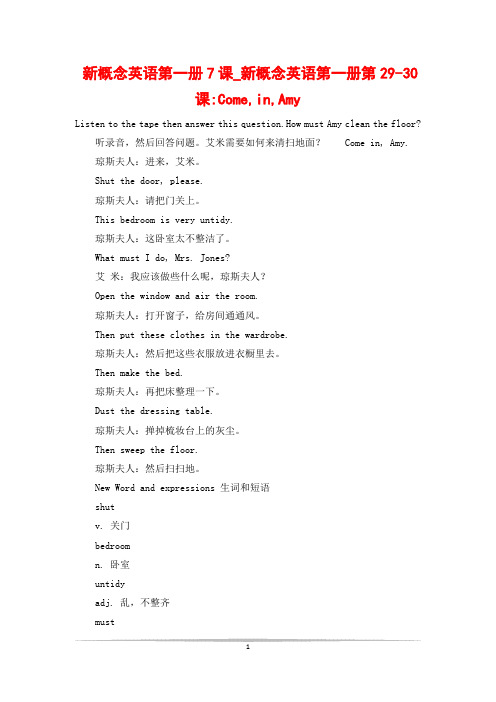
新概念英语第一册7课_新概念英语第一册第29-30课:Come,in,AmyListen to the tape then answer this question.How must Amy clean the floor?听录音,然后回答问题。
艾米需要如何来清扫地面?Come in, Amy.琼斯夫人:进来,艾米。
Shut the door, please.琼斯夫人:请把门关上。
This bedroom is very untidy.琼斯夫人:这卧室太不整洁了。
What must I do, Mrs. Jones?艾米:我应该做些什么呢,琼斯夫人?Open the window and air the room.琼斯夫人:打开窗子,给房间通通风。
Then put these clothes in the wardrobe.琼斯夫人:然后把这些衣服放进衣橱里去。
Then make the bed.琼斯夫人:再把床整理一下。
Dust the dressing table.琼斯夫人:掸掉梳妆台上的灰尘。
Then sweep the floor.琼斯夫人:然后扫扫地。
New Word and expressions 生词和短语shutv. 关门bedroomn. 卧室untidyadj. 乱,不整齐mustmodal verb 必须,应该openv. 打开airv. 使… 通风,换换空气putv. 放置clothesn. 衣服wardroben. 大衣柜dustv. 掸掉灰尘土sweepv. 扫Notes on the text课文注释 1 英文中需用祈使语气来表示直接的命令、建议、告诫、邀请等多种意图。
祈使句一般省略主语you 动词采用动词的原形。
如本课对话中的Come in, shut the door. open the window…等均为祈使句。
2What must I do?我应该做些什么呢?其中的must是情态动词,表示不可逃避的义务或不可推卸的责任。
新概念英语第一册Lesson2930ComeinAmy小学英语初中英语全国通用
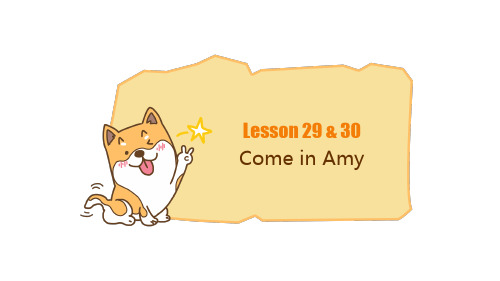
同学们 , 请对照教材听老师讲解! air the room : 给房间通风换气
air : v. 给…通风换气 n. 空气
Language Point
语句讲解、课文讲解
同学们 , 请对照教材听老师讲解!
then : th发 [ð] adv. 然后,接着 e.g. 先买菜,再做晚饭。
open : adj. 开着的 , 营业的
shut : v. 关上
open : v. 打开
e.g. Shut / Open the door. → 祈使句
Language Point
语句讲解、课文讲解
表示礼貌 , 后面加一个逗号 , 然后加please. e.g. Shut the door / window, please. shut作动词时 , 还有一个近义词close e.g. Shut the door / window, please.
做个小练习 巩固一下吧~
"祈使句比较特殊 , 经常省略动作的主语。 ”这种说法对不对?
A. no
B. yes
查看答案解析
答案:yes 解析: 考查祈使句。 祈使句特点: 1.省略主语 2. 直接使用动词原形;
下一题
根据句意填空。 The milk bottle is not clean. _________ it please.
Language Point
语句讲解、课文讲解
empty : adj. 空的 e.g. This bottle is empty. empty : v. 把… 倒空 e.g. Empty the bottle / box.
an empty bottle
有形容词,同时含有动词含义的词 : clean, shut, open, empty e.g. The cup isn't empty. Empty it!
lesson29 come in amy

must是情态动词,表示不可逃避的义务或不可推卸的责任。
Open the window and air the room.
air,空气,这里是动词,意为“通风”
Then put these clothes in the wardrobe. Then make the bed. Dust the dressing table. Then sweep the floor.
Is the dressing table very dirty? Yes, it is.
Asking questions
5
Ask me if the clothes are in the wardrobe. Are the clothes in the wardrobe? No, they aren't.
Comprehesion
5
Are the clothes in the wardrobe? No, they aren't. 6 Is the floor clean? No, it isn't. (It's dirty.)
Asking questions
1
Ask me if the bedroom is very untidy.
回答:
Yes, you must. No, you needn't./ No, you don't have to.
动词原形开头。
Lesson 29 Come in, Amy.
Come in, Amy. Shut the door, please.
Lesson29 Come in

air
名词:空气 in the air 在空中;air condition空调 air pollution 空气污染;by air 坐飞机
动词:使· · · 通风,换气 We air the bedroom every day. 名词:灰尘
dust
动词:掸掉灰尘 She dusted all the book on the shelf.
Group work:
discuss the pronunciation of the words
in group ,one word for one point;
Except the verb phrase,each group represent one word.And then the teacher will read the word randomly.The group should stand up and read the word for three times.Finally,the leader of the group will read a word randomly .The game goes on in turns.
Lesson29 Come in,Amy Lesson30What must I do? 进来,艾米 我应该做什么?
Learning Aims:
Remember the new words and read
the new words correctly; Learn to use the verb phrases in the text and distinguishi them from each other; Grammar:Imperative Sentence ---祈 使句 Can use the modal verb---情态动词 (must)
新概念 第一册第29课时

1.Are you a lazy(懒惰的) kid?
2.How do you clean your bedroom?
3.What must I do if I want to clean my bedroom?
How must Amy clean the floor?
untidy
This bedroom's very untidy.
定意义,如: unhappy, unfair
• air • air bed 充气床垫 • air-conditioner 空调
• put • put sth. +介词短语“把某物放
在... • put on 穿上;戴上(反义词)
take off • put off延期,推迟
• clothes • clothes-horse 晾衣架(室内) • clothes tree 放衣架 • dust • dustbin 垃圾箱 • dustman 垃圾工
This bedroom's very clean.
How can we get a clean bedroom?
open the window
air the room
put the clothes in the wardorbe
make the bed
dust the dressing table
Lesson 29 Come in,Amy!
Wendy
• All things are difficult before they are easy.
新概念第一册课文的翻译及学习笔记:Lesson29

【导语】为了⽅便同学们的学习,为您整理了新概念英语频道⾯的新概念第⼀册课⽂翻译及学习笔记,希望为⼤家的新概念英语学习提供帮助! 【课⽂】 MRS.JONES:Comein,Amy. MRS.JONES:Shutthedoor,please. MRS.JONES:Thisbedroom'sveryuntidy. AMY:WhatmustIdo,Mrs.Jones? MRS.JONES:Openthewindowandairtheroom. MRS.JONES:Thenputtheseclothesinthewardrobe. MRS.JONES:Thenmakethebed. MRS.JONES:Dustthedressingtable. MRS.JONES:Thensweepthefloor. 【课⽂翻译】 琼斯夫⼈:进来,艾⽶。
琼斯夫⼈:请把门关上。
琼斯夫⼈:这卧室太不整洁了。
艾⽶:我应该做些什么呢,琼斯夫⼈? 琼斯夫⼈:打开窗⼦,给房间通通风。
琼斯夫⼈:然后把这些⾐服放进⾐橱⾥去。
琼斯夫⼈:再把床整理⼀下。
琼斯夫⼈:掸掉梳妆台上的灰尘。
琼斯夫⼈:然后扫扫地。
【⽣词】 shutv.关门 bedroomn.卧室 untidyadj.乱,不整齐 mustmodalverb必须,应该 openv.打开 airv.使…通风,换换空⽓ putv.放置 clothesn.⾐服 wardroben.⼤⾐柜 dustv.掸掉灰尘⼟ sweepv.扫 【知识点讲解】 1.今天这节课的句⼦⼤部分都是祈使句。
关于祈使句的⽤法我们在第21课给⼤家详细讲过。
2.WhatmustIdo?意思是“我应该做什么?”must是⼀个情态动词,表⽰“必须”;这句话还可以说成“WhatshouldIdo?”,should ⼀样是情态动词,表⽰“应该”。
3.讲⼏个重点词汇:air这个词本⾝也是名词,意思是空⽓。
- 1、下载文档前请自行甄别文档内容的完整性,平台不提供额外的编辑、内容补充、找答案等附加服务。
- 2、"仅部分预览"的文档,不可在线预览部分如存在完整性等问题,可反馈申请退款(可完整预览的文档不适用该条件!)。
- 3、如文档侵犯您的权益,请联系客服反馈,我们会尽快为您处理(人工客服工作时间:9:00-18:30)。
助动词开头 Do you get up at nine o'clock? Does he feel happy? Did you come back yesterday?
Yes,
/No,
特殊疑问句(不能用yes/no回答,具体问题具体回答)
特殊疑问词 what 什么 how 怎样 whose 谁的 who 谁 which 哪一个 where 在哪里
Lesson 29 Come in,Amy.
进来,艾米。
you he
my your
人称代 词宾格
she
we
our us
you
they their
her its
it
me you him
you
them
主格跟be动词(am is are)的搭配 am is are
一、名词变复数
1. 直接加s 清辅音后读[s],如book-books,map-maps. 浊辅音后读[z],如pen-pens,bag-bags. 元音后读[z],如boy-boys,day-days. 2. 以 s, x, ch, sh 结尾的加 es, 读 [ɪz] ,如 bus-buses,box-boxes,watchwatches. 3. 以f或fe结尾的多变f或fe为v,加es, 读[vz],如knife-knives, live-lives. 少数不变,直接加s,如roof-roofs,读[s].
Sweep the floor.
Lesson 29 Come in, Amy.
Come in, Amy. Shut the door, please. This bedroom's very untidy. What must I do, Mrs. Jones? Open the window and air the room. Then put these clothes in the wardrobe. Then make the bed.
Comprehesion
5
Are the clothes in the wardrobe? No, they aren't. 6 Is the floor clean? No, it isn't. (It's dirty.)
Asking questions
1
Ask me if the bedroom is very untidy.
New words and expressions
shut bedroom
[ʃʌt]v. [ˈbedru:m]n. [ʌnˈtaɪdi]adj.
关门 卧室 乱,不整齐 必须,应该 打开
untidy
must open
[mʌst]modal verb [ˈəʊpən]v.
air
[eə]v.
Dust the dressing table.
Then sweep the floor.
Comprehesion
1
Is Mrs. Jones in the living room? No, she isn't. 2 Is Mrs. Jones in the bedroom? Yes, she is. 3 Is Amy in the bedroom, too? Yes, she is. 4 Is the bedroom tidy? No, it isn't. (It's very untidy.)
一、名词变复数
4. 辅音加y结尾,y改i,加es,读[z],baby-babies. 元音加y结尾,直接加s,读[z],如day-days,boy-boys. 6.o结尾,有的加es,有的加s 读[z], 如tomato-tomatoes,potato-potatoes,hero-heroes. photo-photos, zoo-zoos 7. 不规则 man-men woman-women feet-foot teeth-tooth
动词原形开头。
there be 句型
表示存在,有 there is 否定 there isn't 疑问 is there are there there aren't there are
一般疑问句(能用yes或no回答的句子)
be 动词开头的句子 Are you a teacher?/ Is he a teacher? Yes, /No,
must的否定形式mustn't(must not)表示禁止,译为“不许”,“不能”, 如“
You mustn't talk like that. 你可不能这样说话。
must
三、 must 还可表示猜测,译为“一定是”,如: He must be seventy now. 他一定有70岁了。 四、 must的一般疑问句(将must提到句首) Must I go now?
掸掉 dust
must
一、 1 情态动词本身有词义,表示说话人的语气或情态,但词义不完全, 不能单独作谓语动词,一般只能和动词原形构成谓语动词。
2 情态动词(我们还学过的情态动词有can)后面跟动词原形。
3 情态动词没有人称和数的变化。
二、 must表示“必须”或“应当”,如:
I must go now. 我现在必须走了。
untidy
tidy
open
air
put
clothes
wardrobe
dust
sweep
Pick up apples. 比一比看谁能快速地说出英语。
摘苹果
shut 关门 untidy 乱 must 必须
bedroom 卧室
air 换空气 打开 open put 放置 sweep 扫
衣服 clothes wardrobe 衣柜
dust,灰尘,这里是动词,意为“掸掉灰尘”
water水
Water the flowers. 给花浇水。
Asking questions
3
Ask me if Amy is in the bedroom. Is Amy in the bedroom? Where ...? Where is Amy?
4
Ask me if the dressing table is very dirty.
使……通风,换换空气
New words and expressions
put clothes
[pʊt]v. [kləʊð z]n. [ˈwɔ:drəʊb]n. [dʌst]v. [swi:p]v.
放置 衣服 衣柜 撞掉灰尘 扫
wardrobe
dust sweep
shut
bedroom must
Is the dressing table very dirty? Yes, it is.
Asking questions
5
Ask me if the clothes are in the wardrobe. Are the clothes in the wardrobe? No, they aren't.
主系表结构
肯定句 I am a teacher. 否定句 I am not a teacher. I'm not a teacher. 疑问句 Are you a teacher? He is a teacher. He isn't a teacher. Is he a teacher? be 动词提前
Lesson 29 Come in,Amy.
进来,艾米。
Lesson 29 Come in, Amy.
Listen to the tape and then answer this question. How must Amy clean the floor? 艾米需要如何清扫地面?
回答:
Yes, you must. No, you needn't./ No, you don't have to.
动词原形开头。
Lesson 29 Come in, Amy.
Come in, Amy. Shut the door, please.
This bedroom's very untidy.
2
Is the bedroom very untidy?
Yes, it is. Ask me if Mrs. Jones is in the kitchen. Is Mrs. Jones in the kitchen? Where...? Where is Mrs. Jones?
What must I do, Mrs. Jones?
must是情态动词,表示不可逃避的义务或不可推卸的责任。
Байду номын сангаас
Open the window and air the room.
air,空气,这里是动词,意为“通风”
Then put these clothes in the wardrobe. Then make the bed. Dust the dressing table. Then sweep the floor.
